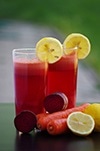Oct 4 2017
In people at higher risk of feeling the cold, and contrary to what scientists thought, beetroot juice doesn't appear to help re-warm the body after exposure to the cold, according to new research.

Beetroot has very high nitrate levels
Nitrate-rich beetroot has inspired a raft of sometimes conflicting studies into its health-giving properties but until now its ability to help warm people up hadn’t been tested.
Nitrates can be converted by good bacteria and other processes within the body into nitric oxide which makes blood vessels widen, carrying warmth to fingers and toes faster.
Lead researcher Ant Shepherd, in the University of Portsmouth’s Department of Sport and Exercise Science, said:
Beetroot has very high nitrate levels – other vegetables, particularly leafy greens, are high in nitrate too, but not to the same degree – so we thought beetroot may make people warm up.
That it didn’t could be because the nitric oxide is being neutralized or converted by oxidants in the body, or it could be that we need to give juice over a longer period.
The study examined the effects on feeling cold or warm in 13 healthy people who suffer from feeling cold in the outdoors.
Despite all registering a meaningful rise in plasma nitrite concentrations, drinking beetroot juice did not have an effect on warming of the extremities (fingers and toes), on endothelial function, on blood pressure, pain or thermal comfort and sensation.
A recent study on the effect of nitrate on blood pressure found it may have an effect, though the results of studies on its effect on small blood vessel function is inconclusive.